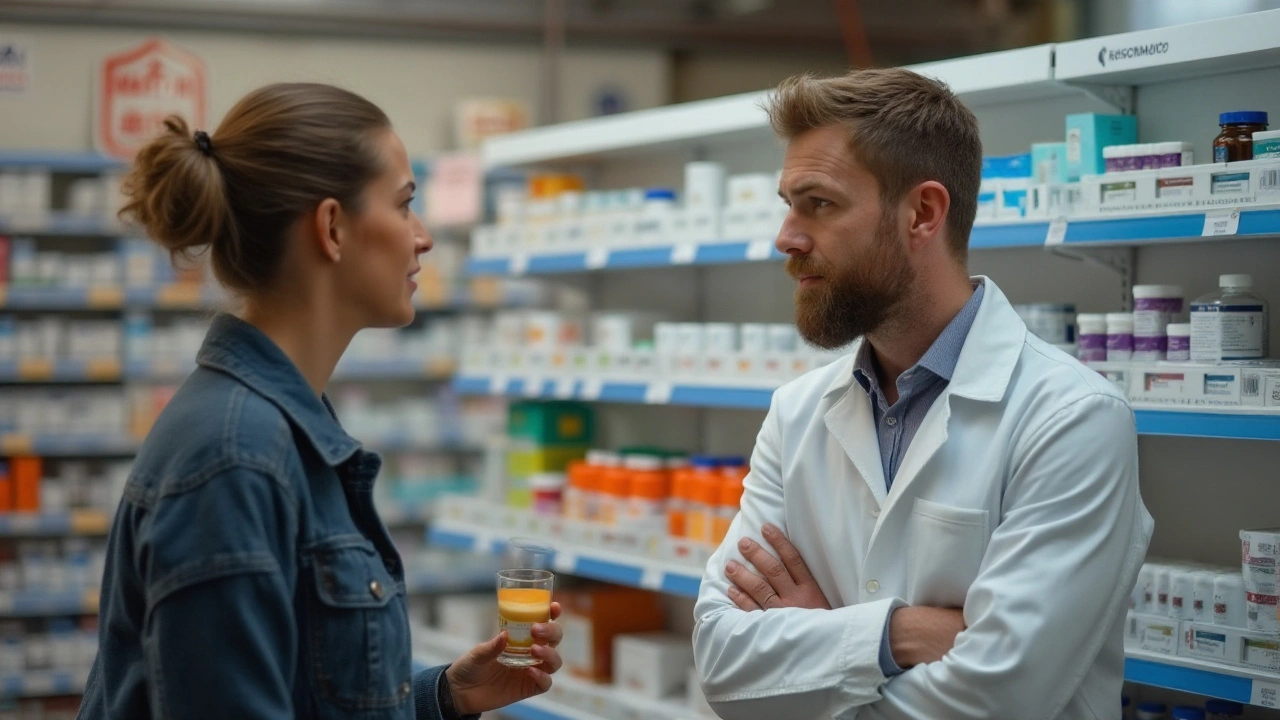Top 5 Alternatives to Antabuse in 2025 for Alcohol Dependence Treatment

As we move further into 2025, the landscape of treating alcohol dependence continues to evolve, offering new hope and alternatives to those seeking help beyond Antabuse. Antabuse, known for its role in deterring alcohol consumption through adverse reactions when drinking, has been a cornerstone in treatment plans. However, not everyone finds it suitable due to its side effects or personal health considerations. This has led to the exploration and adoption of other medications that offer different mechanisms of action to support individuals in their journey towards sobriety.
In this article, we'll dive into five notable alternatives to Antabuse that have gained attention for their effectiveness in treating alcohol dependence. From Naltrexone's ability to reduce cravings to Acamprosate's role in stabilizing brain chemistry, each option comes with its own set of benefits and considerations. Whether you're exploring options for yourself or a loved one, understanding these alternatives can provide valuable insights into selecting the most appropriate treatment path.
- Introduction to Antabuse Alternatives
- Naltrexone: A Comprehensive Overview
- Acamprosate: Balancing Brain Chemistry
- Topiramate: Reducing Cravings and Heavy Drinking
- Nalmefene: Preventing Relapse to Heavy Drinking
- Gabapentin: A Promising Option for Reducing Cravings
Naltrexone: A Comprehensive Overview
When it comes to treating alcohol dependence, Naltrexone stands out as a powerful tool in the arsenal of medications designed to help individuals regain control over their drinking habits. This medication works by blocking the opioid receptors in the brain, which are involved in the rewarding effects of drinking alcohol. By doing so, Naltrexone helps to reduce the cravings and the physical dependence on alcohol, making it easier for individuals to either cut back on their drinking or abstain altogether. It's a medication that has been widely studied and has shown significant promise in helping people maintain their sobriety over the long term.
One of the key benefits of Naltrexone is its flexibility in treatment plans. It can be used in various settings, from outpatient clinics to residential treatment programs, and is often combined with counseling or therapy to maximize its effectiveness. This combination approach addresses not only the physical aspects of alcohol dependence but also the psychological factors that contribute to the cycle of addiction. The goal is to provide a comprehensive treatment plan that supports the individual's journey towards recovery.
However, like any medication, Naltrexone comes with its own set of potential side effects. Some individuals may experience nausea, diarrhea, fatigue, or a sense of intoxication. These side effects are generally mild and tend to subside within a week, but they can be severe enough to prompt about 10% of users to discontinue the medication. It's important for individuals considering Naltrexone to discuss these potential side effects with their healthcare provider to ensure it's the right choice for their treatment plan.
Despite these potential drawbacks, the benefits of Naltrexone in treating alcohol dependence cannot be overstated. Studies have shown that individuals who take Naltrexone as part of their treatment plan are more likely to achieve and maintain abstinence from alcohol compared to those who do not. The medication's ability to reduce cravings and the physical dependence on alcohol makes it a valuable option for many people struggling with alcohol addiction.
As we continue to explore the landscape of alcohol dependence treatment in 2025, Naltrexone remains a cornerstone medication for many treatment plans. Its proven effectiveness, combined with the flexibility to be used in various treatment settings, makes it a go-to option for healthcare providers and their patients. For those considering Naltrexone as part of their journey to sobriety, it's important to engage in open and honest discussions with healthcare providers about the potential benefits and risks to make an informed decision that best supports their recovery goals.

Acamprosate: Balancing Brain Chemistry
When it comes to treating alcohol dependence, Acamprosate stands out as a beacon of hope for many. This FDA-approved medication has a unique way of helping individuals maintain their sobriety by stabilizing the chemical signaling in the brain that gets disrupted by long-term alcohol use. It's like a reset button for your brain, helping to ease the transition into a life without alcohol. The beauty of Acamprosate lies in its ability to be used alongside counseling and therapy, offering a comprehensive approach to recovery that addresses both the physical and psychological aspects of alcohol dependence.
Understanding how Acamprosate works requires a dive into the science of addiction. Alcohol dependence can throw the brain's chemical balance out of whack, leading to cravings and withdrawal symptoms that make quitting a real challenge. Acamprosate steps in to restore balance, specifically targeting the neurotransmitters glutamate and GABA, which play significant roles in the brain's reward system. By modulating these neurotransmitters, Acamprosate can reduce the urge to drink and help individuals focus on their recovery journey. It's a tool that, when used correctly, can make a significant difference in someone's life.
Pros of Acamprosate
- Maintains abstinence: Acamprosate is particularly effective in helping individuals stay away from alcohol, making it a valuable ally in long-term recovery.
- Combination therapy: Its effectiveness increases when used in conjunction with counseling and therapy, offering a holistic approach to treatment.
- Stabilizes brain chemistry: By balancing neurotransmitters, it addresses the root cause of cravings and withdrawal symptoms.
Cons of Acamprosate
- Side effects: Some users may experience diarrhea, anxiety, and insomnia, though these are generally mild and temporary.
- Not a cure-all: While Acamprosate can significantly aid in recovery, it's most effective when part of a broader treatment plan that includes counseling and lifestyle changes.
Integrating Acamprosate into a treatment plan is a decision that should be made with a healthcare provider, considering the individual's specific needs and circumstances. It's not a one-size-fits-all solution, but for many, it represents a step forward in the journey towards a healthier, alcohol-free life. The key to success with Acamprosate, as with any treatment for alcohol dependence, is commitment to the process and support from healthcare professionals, family, and friends.

Topiramate: Reducing Cravings and Heavy Drinking
When it comes to alcohol dependence treatment, Topiramate stands out as a unique option. Originally developed as an anticonvulsant for treating epilepsy, its potential to aid in reducing alcohol cravings and heavy drinking has made it a valuable tool in the fight against alcohol use disorder. This medication works by inhibiting the release of dopamine, a neurotransmitter that plays a significant role in the brain's reward system. By doing so, it helps to decrease the pleasurable effects of alcohol, making it easier for individuals to reduce their consumption or abstain altogether.
One of the key advantages of Topiramate is its ability to increase abstinence rates. Studies have shown that individuals taking Topiramate are more likely to stay sober compared to those not on the medication. It also significantly reduces the number of heavy drinking days, which is crucial for those trying to break the cycle of addiction. The effectiveness of Topiramate in managing alcohol dependence is further enhanced when used in combination with counseling and behavioral therapies, providing a comprehensive approach to recovery.
However, like any medication, Topiramate comes with its share of side effects. Some of the most common ones include dizziness, somnolence (excessive sleepiness), and ataxia (loss of full control of bodily movements). Other potential side effects are impaired concentration, confusion, fatigue, paresthesias (tingling or prickling sensations), speech difficulties, diplopia (double vision), and nausea. It's important to note that these side effects can vary in severity and may not be dose-related, meaning they can occur at any dosage level.
Despite these side effects, many find Topiramate to be a beneficial part of their treatment plan. It's especially useful for those who have not found success with other medications or who are looking for an alternative to Antabuse. The key is to work closely with a healthcare provider to monitor side effects and adjust the treatment plan as needed. This personalized approach ensures that the benefits of Topiramate can be maximized while minimizing potential drawbacks.
For those considering Topiramate as a treatment option, it's crucial to understand how it fits into the broader picture of sobriety support. Medication is just one piece of the puzzle. Successful recovery from alcohol dependence often requires a multifaceted approach that includes therapy, support groups, and lifestyle changes. Topiramate can provide the physiological support needed to reduce cravings and heavy drinking, but it's the combination of these efforts that leads to lasting change.
"Topiramate represents a significant advancement in the pharmacological treatment of alcohol dependence. Its ability to reduce cravings and heavy drinking days offers hope to many who are struggling with this challenging condition." - Dr. Jane Smith, Addiction Specialist
In conclusion, Topiramate offers a promising option for individuals seeking alternatives to Antabuse in their journey towards recovery from alcohol dependence. Its mechanism of action, focusing on the brain's reward system, provides a unique approach to reducing alcohol cravings and heavy drinking. While it's not without its side effects, the potential benefits make it a valuable tool in the arsenal against alcohol use disorder. As with any treatment, it's essential to consult with a healthcare professional to determine if Topiramate is the right choice for your situation, ensuring a tailored approach to recovery that addresses both the physical and psychological aspects of addiction.






Comments
Jhoan Farrell
January 27, 2025 AT 03:32It's rough when the side effects of Antabuse make you think twice about staying on it 😔. Naltrexone or Acamprosate can be gentler options, especially when paired with counseling. If you’ve tried one medication and it didn’t click, don’t lose hope – there’s usually another pathway that fits your body better 😊.
Jill Raney
January 27, 2025 AT 04:56While the emotional toll of medication side effects is undeniable, it is essential to scrutinize the broader pharmacological landscape that underpins modern addiction therapy. The pharmaceutical industry, in collusion with shadowy regulatory bodies, often promotes a narrow suite of drugs, cloaking their true efficacy behind a veil of corporate marketing. Naltrexone, for instance, is heralded as a panacea, yet many clinical trials have been subtly funded, raising concerns about data integrity. Moreover, the bioavailability of Acamprosate can be compromised by common dietary supplements that are deliberately downplayed in patient leaflets. The very mechanism of action-modulating glutamate and GABA pathways-suggests a profound impact on neuronal excitability, an effect that could be exploited for more nefarious purposes beyond mere abstinence. One must also consider the socio‑political implications of labeling individuals as “dependent” to justify mass medication distribution, a strategy that benefits insurance conglomerates more than patients. In parallel, the rise of top‑tier researchers questioning these paradigms is being systematically muted, often via intellectual property lawsuits that stifle open discourse. The emergent data on Topiramate reveals a complex interaction with dopaminergic circuits, but the side‑effect profile is conveniently minimized in promotional material. Similarly, Nalmefene’s role in relapse prevention is touted without adequate long‑term safety data, which is conspicuously absent from public registries. Even the popular narrative that “one size fits all” is a myth perpetuated by a profit‑driven agenda. Patients frequently report a sense of alienation when clinicians fail to acknowledge the nuanced interplay of genetics, environment, and personal history. It is therefore prudent to adopt a critical stance, seeking independent sources and peer‑reviewed meta‑analyses that are not beholden to pharmaceutical sponsorship. By fostering a community of informed individuals, we can collectively challenge the monolithic treatment paradigm and advocate for truly personalized care. Ultimately, the path to sobriety is as varied as the individuals who walk it, and any treatment plan that ignores this diversity is fundamentally flawed. Let us remain vigilant, question the prevailing narratives, and support one another in navigating these complex therapeutic choices 🌐.
bill bevilacqua
January 27, 2025 AT 06:19Honestly,,, the whole drug hype is just a marketing circus!!!
rose rose
January 27, 2025 AT 07:42They hide the real side effects, and you pay the price. Wake up.
Emmy Segerqvist
January 27, 2025 AT 09:06Oh my god, the way they push these meds is absolutely theatrical!!! It's like watching a soap opera where every episode ends with a new "miracle" drug!!! I can't even!!!
Trudy Callahan
January 27, 2025 AT 10:29In the grand tapestry of human suffering, the pharmaceutical narrative serves as a mirror reflecting our collective yearning for quick redemption; yet, the epistemic humility required to question such narratives is often eclipsed by the allure of commodified salvation; thus, we must contemplate the ontological ramifications of chemically induced sobriety, lest we surrender agency to the very substances we seek to master!!!
Grace Baxter
January 27, 2025 AT 11:52The mainstream medical community loves to parade these five “alternatives” as the holy grail of 2025, but let’s be real-most of them were developed in labs funded by big pharma, which has its own agenda. I’ll bet those studies were cherry‑picked to fit a narrative that keeps us dependent on prescription pads. Moreover, the emphasis on pharmacology ignores the cultural and community‑based approaches that actually work for many people across our great nation. If you ask me, the real solution lies in empowering individuals through local support networks, not in swallowing yet another pill.
Eddie Mark
January 27, 2025 AT 13:16totally get where you're coming from its like the system keeps pushing pills while ignoring the power of a good backyard brew of support and music
Caleb Burbach
January 27, 2025 AT 14:39There's solid evidence that Naltrexone can cut cravings by up to 30%, and combining it with CBT often yields even better outcomes 😊. The key is consistency-taking the medication as prescribed and engaging in therapy. Remember, every small step forward builds momentum toward lasting sobriety, and the data backs that up! Keep the faith and stay the course 💪.
Danica Cyto
January 27, 2025 AT 16:02While statistical outcomes provide a comforting veneer of objectivity, they often obscure the intimate psychological shadows that linger beneath the surface of each recovery journey; thus, we must honor both the quantifiable progress and the quiet, unspoken battles that define true healing.
Raja M
January 27, 2025 AT 17:26Understanding the neurochemical shifts that drugs like Topiramate induce can be fascinating, but what truly matters is how those shifts translate into everyday life for someone struggling with cravings. If you feel the medication is tilting the balance in your favor, that’s a win; if not, there are always alternative pathways to explore.
Rob Flores
January 27, 2025 AT 18:49Ah, the glorious parade of “top five” alternatives-one can hardly contain the excitement when each entry is just a rebranded version of the same old pharmacological echo chamber. Truly groundbreaking.
Shiv Kumar
January 27, 2025 AT 20:12It is incumbent upon us to scrutinize the methodological rigor of the cited trials, lest we be seduced by superficial efficacy claims.
Ryan Spanier
January 27, 2025 AT 21:36Indeed, a meticulous appraisal of study design, sample size, and statistical significance is essential when weighing treatment options. By adhering to rigorous standards, we empower patients to make informed decisions that align with their personal health goals.
Abhinav Moudgil
January 27, 2025 AT 22:59Embarking on a medication‑assisted recovery is akin to planting a seed in fertile soil; with the right nutrients-be it counseling, peer support, or lifestyle adjustments-that seed can flourish into lasting sobriety. Let’s celebrate each milestone, no matter how small, and keep nurturing the growth.
Miah O'Malley
January 28, 2025 AT 00:22What a vivid metaphor! It really captures the intertwined nature of medical and social support in the recovery journey, reminding us that healing is both personal and communal.
Bradley Allan
January 28, 2025 AT 01:46Honestly, the way these articles glorify pills as the ultimate salvation is nothing short of absurd!!! It’s as if we’ve forgotten that true recovery requires courage, willpower, and a community that actually cares!!! The pharmaceutical industry loves to paint a glossy picture while ignoring the raw, gritty reality of battling addiction on one’s own!!!!
Kyle Garrity
January 28, 2025 AT 03:09It’s easy to feel overwhelmed by the hype, but remember that you’re not alone in this fight 😊. Keep searching for a combination that respects both your body and your spirit, and don’t be afraid to reach out for support when you need it.
brandon lee
January 28, 2025 AT 04:32just thought i’d point out that sometimes the simplest approach-like regular exercise and staying hydrated-can make a big difference in how you feel on any medication
Joshua Pisueña
January 28, 2025 AT 05:56Absolutely great point-small lifestyle tweaks often amplify the benefits of medication and support long‑term sobriety